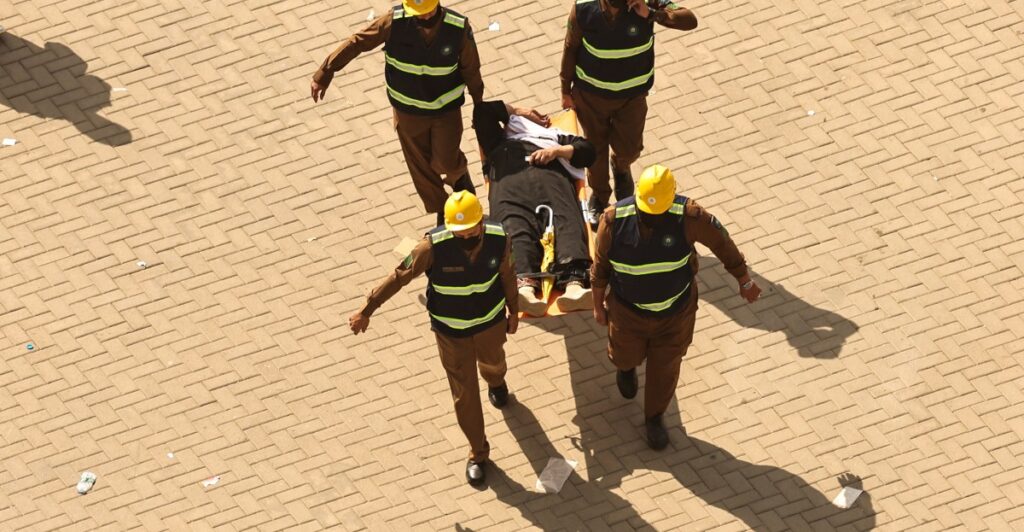Record-Breaking Temperatures Claim Over 1,300 Lives During Saudi Arabia’s Hajj Pilgrimage
Riyadh, Saudi Arabia — This year’s Hajj pilgrimage has been marred by unprecedented fatalities, with more than 1,300 people succumbing to extreme heat in Saudi Arabia. Temperatures soared to a staggering 125 degrees Fahrenheit, raising urgent concerns about the impact of climate change and the kingdom’s preparedness for future pilgrimages.
The sweltering summer in the Gulf region has always posed challenges for the annual pilgrimage, but this year’s extreme conditions highlight a troubling trend that may become the norm. The Saudi government faces mounting pressure to implement effective measures to mitigate heat-related deaths during Hajj, especially as the world continues to grapple with climate change.
This year’s fatalities were not solely due to the oppressive heat; a significant factor was the influx of unauthorized pilgrims circumventing the official visa system. In their quest to fulfill this sacred duty, many Muslims resorted to obtaining tourist visas that did not include provisions for Hajj, leaving them without essential accommodations and government oversight at the holy sites.
For Muslims, Hajj is one of the five pillars of Islam, a mandatory religious duty for those who are physically and financially able to undertake the journey to Mecca, the birthplace of the Prophet Muhammad. To manage the massive influx of believers each year, Saudi Arabia restricts the number of Hajj visas it issues. This limitation leads many to seek alternative means, often through companies that provide tourist visas lacking the required permissions and accommodations.
As a result, unauthorized pilgrims — lacking official aid and exposed to extreme heat — comprised the majority of this year’s fatalities, according to Saudi authorities. The government has reported that 141,000 unauthorized pilgrims were treated for heatstroke, with many more believed to have suffered without medical attention.
The cost of undertaking the Hajj can range from $3,000 to $17,000, depending on the chosen package and the pilgrim’s country of origin. Some countries, like Indonesia, subsidize parts of Hajj travel, but for many pilgrims from poorer nations, the journey remains financially burdensome. Unauthorized means become an attractive, albeit risky, alternative.
Historically, the Hajj has witnessed other mass casualties, such as the 2015 stampede that killed nearly 2,400 people. Since then, the Saudi government has invested in significant infrastructure projects to improve safety. However, the rising temperatures present a new challenge that requires comprehensive solutions.
In response to the crisis, many governments are scrutinizing travel brokers who facilitate unauthorized pilgrimages. Egypt, for example, has sanctioned 16 travel brokers following the deaths of 638 unregistered Egyptian pilgrims.
Looking ahead, Saudi Arabia must address two critical issues: unauthorized pilgrimages and the growing threat of climate change. The kingdom’s ongoing tourism expansion plan, which includes adding up to 200,000 hotel rooms and aiming for 150 million tourists by 2030, complicates these challenges.
Mitigating the risks associated with extreme heat will require the kingdom to enhance medical infrastructure, provide more shading and air-conditioned facilities, and possibly stagger pilgrimage schedules. Additionally, global climate targets must be addressed as regional temperatures will continue to rise, further endangering future pilgrims.
Though Saudi Arabia has pledged to achieve net zero carbon emissions by 2050, it remains one of the world’s top oil producers. The kingdom’s dependence on oil, coupled with the relative inaction of other major polluting nations, suggests that extreme heat episodes will persist.
As the world watches, Saudi Arabia’s response to these pressing issues will be critical in ensuring the safety of future Hajj pilgrims.
